There was a certain foreboding. Only the River Flows (河边的错误 dir. Wei Shujun literally The Mistake at the Riverside), a bleakly surreal pseudo-noir art film reminiscent of David Lynch and based on a story by Yu Hua, was October’s breakaway hit. Audiences pondered over what in the film was real and what was hallucination; both realms were equally dark. The further the lead character, a detective, probed into the truth of the case, the deeper the descent into madness. Suspense grew along with a diminishing promise of resolution.
Then Gaza. positions politics readers are doubtless familiar with the official state position: cease-fire, generally pro-Palestine. On academic and leftist social media sites, there was a flurry of translated work on Israel and Palestine. Edward Said featured prominently. A translation of Andy Clarno’s 2023 essay “Neoliberal Apartheid in Palestine” (from the IB Tauris Handbook of Sociology and the Middle East) got wide circulation. Before this war, little attention was paid to Israel/Palestine. Now, many were asking, as elsewhere in the world, whether this might be the beginning of World War III. There were also darker currents. One video that got wide circulation—the version I saw appeared on the WeChat channel of a prominent leftist workers’ rights organization—explained that Western capitalism has long been controlled by an international Jewish cabal, Jews who had originated in Khazar. These Khazar Jews, they claimed, had financed western wars and imperialism, including the Russian Revolution. Lenin had promised that in exchange for financial support for the revolution he would allow the formation of a Jewish State in Khazar (whose territory has some overlap with Ukraine). He reneged on his promise, and the current war in Ukraine was aimed at fulfilling the long-held dream of a Jewish Khazar state. The war in Gaza was also somehow a part of this.
Premier Li Keqiang died in Shanghai on Friday October 27, and the state reaction was predictably muted. In Shanghai and elsewhere, rumors circulated that his death was not how the officials had reported it. “How is it possible that a leader could die of a heart attack at age 68?” was a line I heard many times. He had been the most overshadowed and least noticed Premier in the history of the PRC, but deaths of leaders are always sensitive times. At his death, he quickly became “the people’s premier.” This was not the state’s preferred narrative. Public display of grief was carefully monitored: the state had long experience with the politics of mourning, where affect is never limited to the one mourned[1]. Social media and public opinion were not so readily contained. Right after Li’s death, many posted videos of Malaysian Chinese singer Liang Jingru’s (Fish Leong) popular song 可惜不是你 (kexi bushi ni) “A Pity It Wasn’t You”, and no one missed the referent. These posts, and all references to the song, disappeared quickly.
The day after Premier Li’s death, photos briefly circulated of a man dressed in a metallic costume carrying a version of the sign, but with one word added: ”我在上海很想你死“ (wo zai shanghai henxiang ni si I’m in Shanghai and really want you to die” (https://twitter.com/whyyoutouzhele/status/1718281505481326684). The whyyoutouzhele twitter account reported that he had been detained and questioned. Some social media commentators thought that the road sign meme contained a reference to the Wulumuqi Road demonstrations of November 2022, among whose mediatic representations was a photo of workers carrying away a Wulumuqi Road street sign.[2]
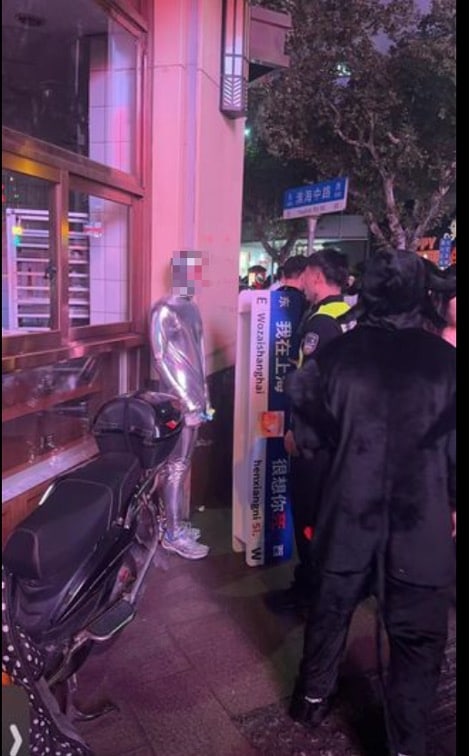
This needs some background. In the summer of 2021, a picture of a road sign in the Pudong district got a lot of amused attention:

“I miss you in Shanghai”. Was there really a street with this name? The sign disappeared soon after. The reaction to the sign was amused and playful; copies proliferated. The “I’m in Shanghai and I really want…” meme was born.
Essays on Weibo and elsewhere gave their versions of the real objects of mourning after Li’s death: the end of an era of compassion, egalitarianism, simplicity, uprightness, democracy, fairness, openness. Or as one Weibo essay put it:
What is being commemorated here differs from that of several decades ago [viz. 1989] and differs greatly from last year’s events (viz. “white paper revolution”). It is rather a new sense of human intimacy, a common humanity’s recognition of itself. The core of this recognition is not the deceased person, but rather the self, and it is probably best understood that the object of mourning is not that person but is rather for the era when there was hope for the individual self. That time is not long past, and carries a certain vitality and warmth, allowing people to reflect on the nature of those recently passed times…
Where does this commemoration lead? In all likelihood, it will not lead to a “grand narrative”, because it is inherently individual and decentralized. However, this kind of commemoration also brings a new form of power. It reflects a social consensus and a new structure of feeling. It is no longer “political”, and for this very reason it is the “new politics”. It also seems to hold a faint glimmer of hope. As Hayek said, “An order is desirable not because it puts the elements in their place, but because it allows new forces to grow out of it that could not have grown out of it otherwise.” [nb: I couldn’t find the source of this quotation; it’s probably from a Chinese translation of Hayek’s Kinds of Order in Society][3]
Liberal and libertarian voices such as this are common on social media, far more common than voices from the nationalist left, academic or otherwise, which have largely retreated from popular commentary on national affairs, instead focusing their critical energies on South-South politics, US Imperialism, and other global issues. One friend, from the non-nationalist left, opined that this was due to the public ridicule that erupted whenever they praised national policy.
Halloween approached in Shanghai amid those currents.
As in Japan, South Korea, and elsewhere in Asia, Halloween in Shanghai is a young adult’s holiday centered on costumes and alcohol (Halloween began its transformation into an adult holiday in the US only in the 1980s, beginning with ad campaigns from the beer industry). The main action is in an area of the Former French Concession centering on the middle sections of Huaihai Road, Changle Road, and Julu Road, and the plaza next to the popular nightclubs and bars adjoining Fuxing Park, south of Huaihai Road. The area has long been one of remarkable social and architectural unevenness, which is somewhat odd given its location in the center of one of Asia’s most expensive cities. Huaihai Road is a major thoroughfare, lined with upscale retail outlets. In the pre-war French Concession, it was called Avenue Joffre, and was known for its cosmopolitan character, with the upscale cafés and other gathering places depicted in modernist haipai literature. As Shanghai began its reform-era transformation in the 1990s, in an effort to revive that cosmopolitan spirit, the district authorities stipulated that the majority of retail establishments on Huaihai Rd. should feature international brands. The blocks to the north, on Changle and Julu Roads, contained a mixture of pre-war and post-1949 low-rise housing with small retail outlets at street level, mostly catering to everyday needs: hardware, sundries, tailors. During the boom years of the 1990s and 2000s, some buildings in the area were replaced with upscale hotels and high-rise apartments, yet these were intermixed with slum-like single-story alley housing as well as subdivided, crowded residences. Expensively renovated single apartments sometimes share buildings with small single-room dwellings with shared kitchens. Small fashion boutiques and restaurants gradually joined the mix.
Over the past several years, the area has evolved into a something like a youth entertainment district. One anchor is INS (which stands for “into nothing serious”) next to a plaza in Fuxing Park, a six-story mixture of extremely upscale and moderately downscale clubs and bars. There is also the embarrassingly named Youth Energy Center (青年力中心) on Huaihai Road, a collection of clothing and shoe stores, clubs, and restaurants, with a large streetside plaza scattered with food and beverage carts. To the north, in recent years, Changle and Julu Roads have seen an explosion of small beer and cocktail bars, ranging from grungy to upscale. Some of the beer bars have little or no indoor seating; customers buy drinks and spread out by the dozens on the sidewalks and curbs. The area thus had appeal to a wide-range of young people: fashionista clubbers, slackers, students, white collar employees just off work. I got to know a few of the young people who frequented a beer bar on Julu Road: rock-and-rollers, former skateboarders; some thought of themselves as rebels too. Several had participated in the demonstrations on November 26th and 27th 2022 on Wulumuqi Rd.,” the so-called “white paper” revolution.[4] They didn’t think of themselves as particularly political; their orientation was to their small subculture of musicians, artists, and fans. One thing that stood out about them was that they weren’t glued to their mobile phones, posting pictures and texts every few minutes on social media, as most young people are. More on this, and other crowds, below.
***
Huaihai Road was closed to traffic early in on Halloween night, and the Middle Huaihai Rd. subway station (line 13) was closed as well. Most of the police, as well as the biggest crowds, were on Huaihai Rd. Several shopkeepers I interviewed estimated the numbers at 20,000 or more. When I got to Changle Road., east of Shanxi South Road it initially looked like a huge demonstration: the road was filled with marching people, not many of whom were in costume. It turned out that the excitement centered on the cosplayers, dressed in elaborate costumes based mostly on characters from anime, imperial costume dramas, popular films and music, and video games, who vogued in front of picturesque storefronts as the crowds pressed around them to take photos. Not a small number were cross-dressers, who sometimes posed with other cosplayers in exaggerated tableaux vivants, sometimes acting out small skits. The police had a subdued presence. One friend heard a policeman explain to the people he was telling to move along that “I’m not a cos.” A friend drinking at a streetside bar wrote that the red and blue flashing lights of the police cars among the costumed crowd gave the scene the atmosphere of an outdoor disco. Many photos of the more political costumes— 大白 (”big white” health workers from the COVID times), the young men dressed as Lu Xun with the quotation “medicine will not save China”, PCR testers taking throat swabs, the woman festooned with sheets of white paper in reference to last fall’s protests, the woman carrying a small doll labeled “third child”, in reference to recent policies encouraging three children– have circulated online and in news reports such as here and the NYT article here (the NYT piece notes the strong LGBTQ presence). Interested readers can find a video compilation here. Last year before Halloween, the authorities circulated admonitions noting that costumes referring to COVID or COVID policy were forbidden (there were a few anyway). The warning was not repeated this year.
The street-sign meme recurred in various ways. I liked the multiple layers of this one, which I haven’t seen reprinted in Western media:
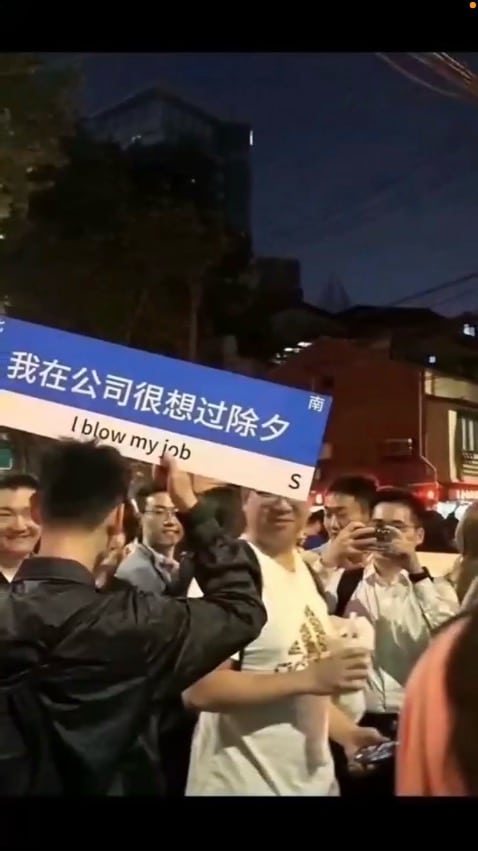
The Chinese sign, modeled on the “I’m in Shanghai and really want you to die” sign mentioned above reads “I’m in my company and really want to celebrate New Year’s Eve.” Chu xi, “New Year’s Eve”, is a homophone for “Remove Xi”. For this reason, at many workplaces last year, New Year’s Eve was neither celebrated nor mentioned by name.
Another variant of the street-sign meme:
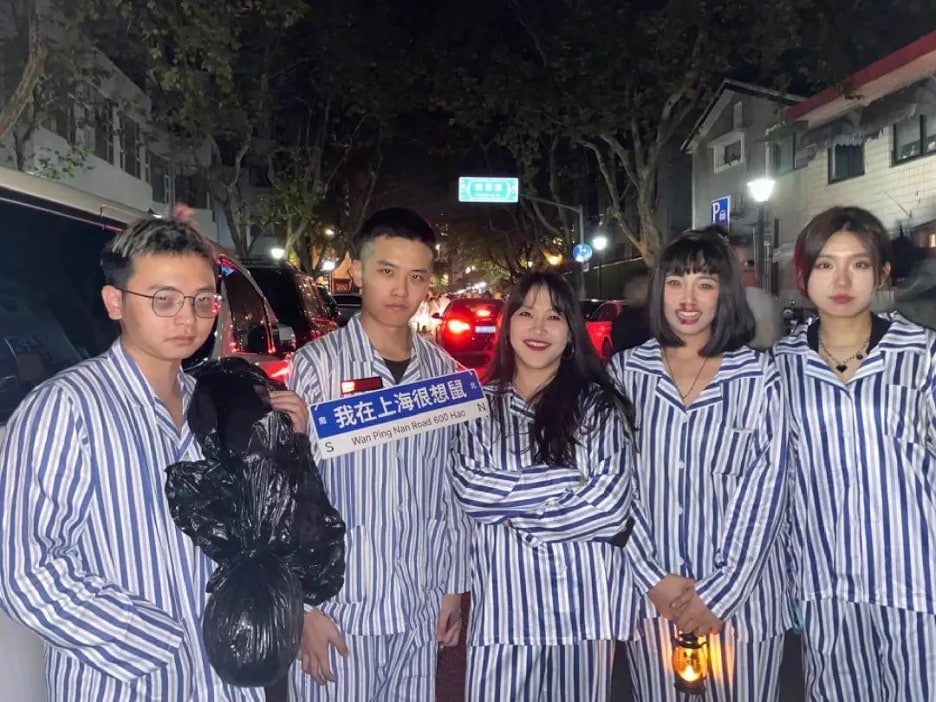
The street sign reads: “I’m in Shanghai and I really want rats”. Shu (rats) is a homophone in the Shanghai dialect for “die”; in Shanghainese the spoken line could read “I’m in Shanghai and I want to die.” The crowd is dressed in hospital-patient garb, and the address printed in smaller type at the bottom is that of the Mental Health Center affiliated to Shanghai Jiaotong University Hospital. The organizer of this display explained that he thought that writing the regular character for “die” might be too sensitive.[5]
A compendium of participants’ stories about their Halloween preparations, as well as the evidence from the costumes and tableaux themselves, mention months of preparation, and several mentioned coming to Shanghai from afar. Many who might have shared only virtual connections in fan communities found themselves together for the first time, checking each other out.[6] Costumes from anime, imperial costume dramas, popular films and music, and video games were the vast majority. I didn’t personally see any of the political ones, and I didn’t talk with anyone who had. But I’m sure that the tens of thousands of people on the scene scoured social media records in the following days. They found images like the following (photos and text from the Youthology site cited above):
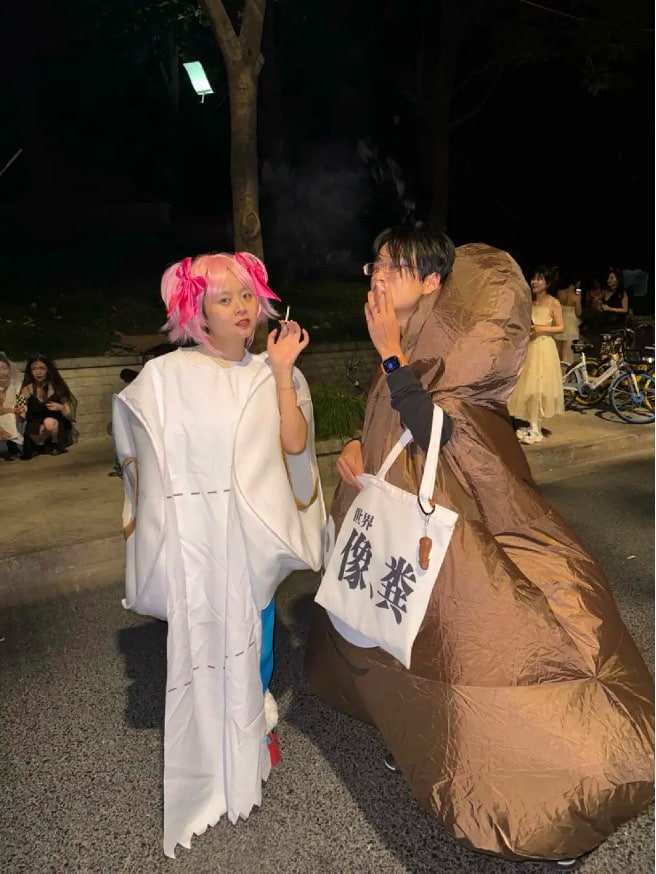
“The world is like shit” (The characters for “the world” are in small typeface. “Like shit” is a homophone for “elephant shit”).
“It was really hard to find the toilet-paper costume… The guy we bought it from online said he’d been getting hundreds of inquiries a day for toilet-paper costumes. Weird… Every time we posed for a photo, we’d always have the toilet paper wiping the head on the shit costume. That’s because even though the world is shit, we wanted to help people wipe clean their beautiful bodies. We want to tell everyone: you must be as a beautiful flower in a world of shit.”
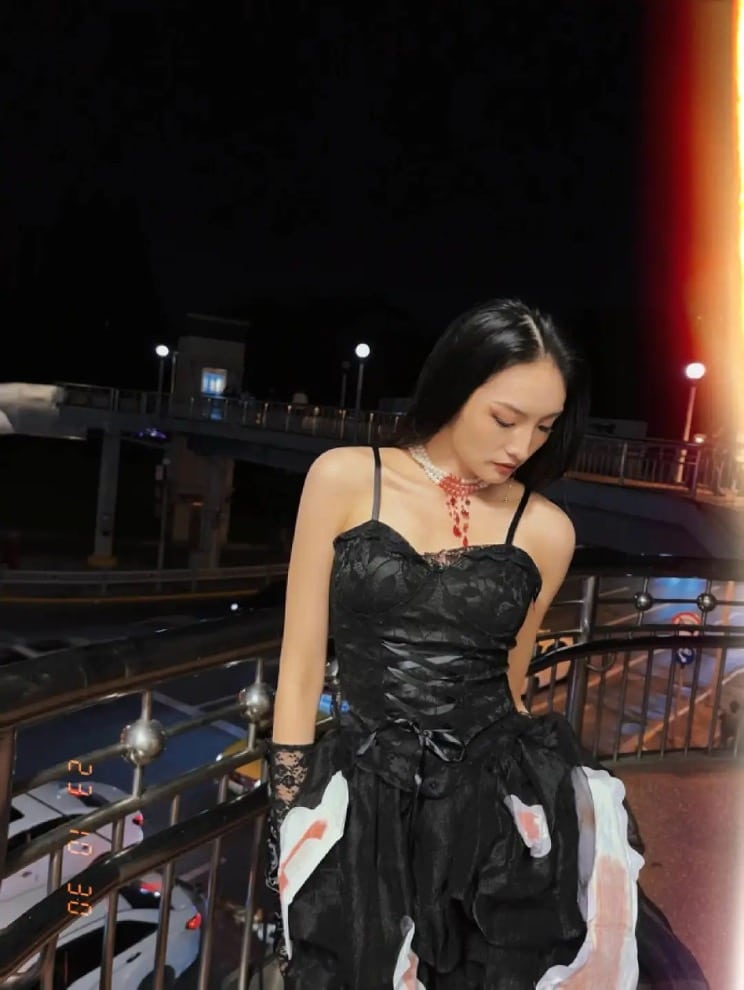
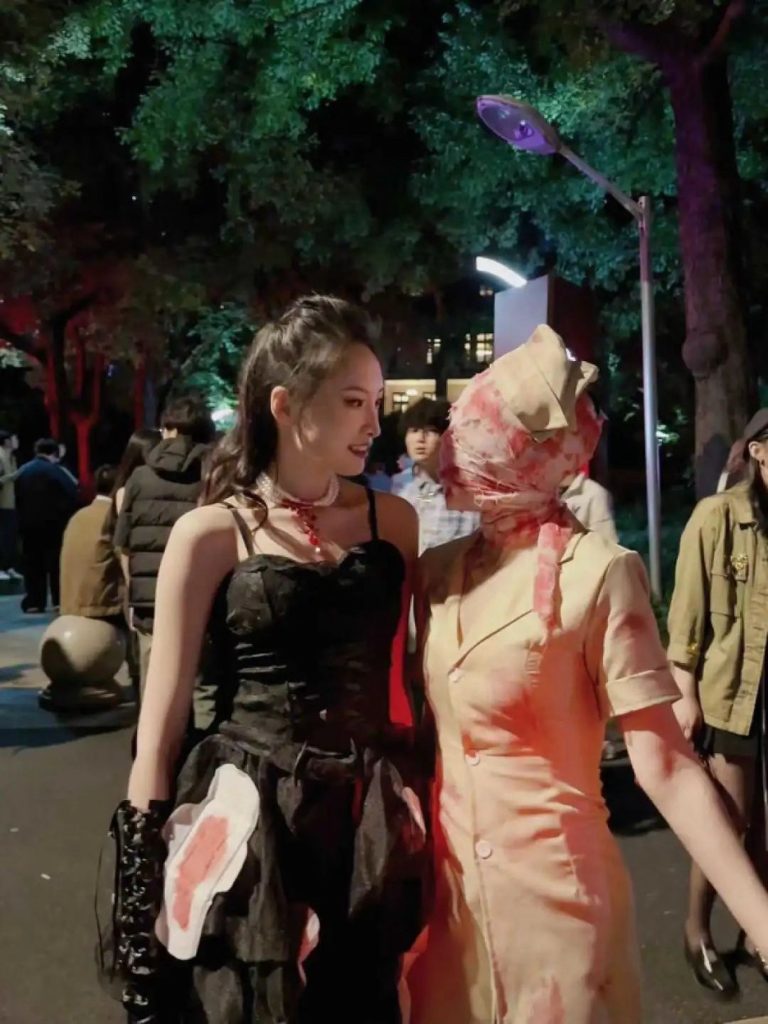
“Halloween is a lot about blood, and my period is my most common and most intimate experience with blood. I originally wanted to dress as a blood-stained pad, but couldn’t find any of those costumes online… At first I was a bit nervous going out dressed like this because there were a lot of really elaborately costumed people on the street; it was a really extroverted scene[7]. But after a woman posed for a photo with me I relaxed. I didn’t know who she was and couldn’t see anything but her eyes, but she said to me, ‘You’re awesome. You’re beautiful’. At that moment I realized that the feeling of power you get from the support and praise that women give to each other was stronger than I had ever known.”
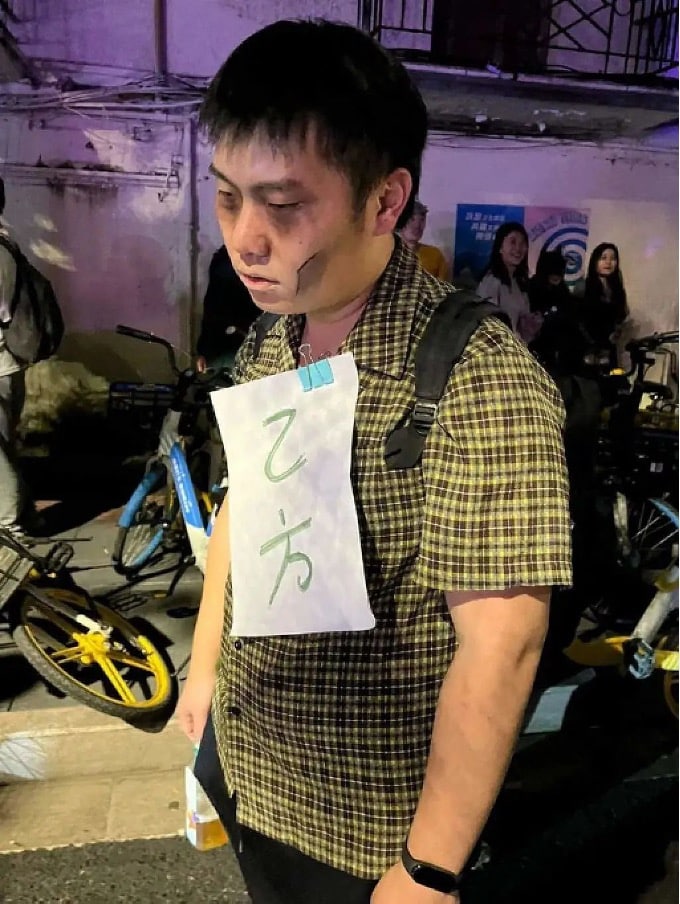
“I wanted to join the festivities after work, but I was so tired that I just put on some black eyeshadow and wrote on a piece of ordinary paper “Party B” [“debtor”, “payer”, etc.]. Other than that, I wore what I had worn to work that day. A lot of people got very excited when they saw me, and they would come over to comfort me, and some of them would say, ‘I’m Party A,’ or ‘I hope you become Party A soon’.”
***
I went back to the area on November 4 after a few days spent reading social media discussions to talk to shopkeepers and others on the scene about what they had seen, especially in places where I hadn’t been that night. I ended up at the beer bar, whose denizens were largely disdainful of the social media circus on Halloween night. None thought it had been political, calling it instead a mass instance of 发泄 , “letting off steam”. There was nothing on the scale of Shanghai’s Halloween elsewhere in the country. Some saw in that an indication of Shanghai’s relatively more open and cosmopolitan culture, mixed with lingering resentment over the 2022 lockdown. One person at the beer bar that night opined that the crowds were mostly 外地 , “non-Shanghainese”, i.e. rubes easily carried away by the latest superficial trends. I heard the remark about “non-Shanghainese” from others too. There is a Shanghai imaginary that sees all that they don’t like about the city as the fault of “non-Shanghainese”, including those who staff municipal government offices. In this city, as elsewhere, popular resentment can take many forms.
There has been much recent reporting in the west about youthful malaise in China, given the state of youth unemployment, including among university graduates. One friend, who has just begun her career as university faculty member, has been stunned at the number of her students who are trying to join the CCP, not out of any ideological or political conviction, but as a way to securing advantage in their search for a job. She thinks that university students today, particularly those not in the top ten or twenty universities whose job prospects after graduation are fairly secure, are much more conservative and risk-averse than non-student youth. Faculty across the arts, social sciences, and humanities remark often about the changed state of their institutions: less space, more control, more hopelessness.
My impression from talking with young people of varying backgrounds over the last couple of months has been of a growing orientation towards small groups or communities, a desire that became more salient after the COVID lockdowns and Dynamic Zero measures of last year. Most of this is fairly innocuous, at least on the surface: fan/idol/gamer/consumption-oriented culture. These “communities” most commonly encounter each other, as elsewhere in the world, online. Particularly salient is the Little Red Book (小红书 ) platform, skewed toward the under 30 crowd and often described as a combination of Instagram, Pinterest, and Amazon, featuring v-logs, podcasts, narratives, and product reviews. Founded in 2013, it is the fastest growing consumer/lifestyle platform in China, and in addition to its e-commerce presence is a major way for members of “lifestyle” subcultures to find and communicate with each other. Recently the platform has sponsored off-line group activities such as city walks, used clothing exchange, and zero-waste practices. Halloween in Shanghai was in many respects a physical and social manifestation of these fan communities that exist on Little Red Book or elsewhere online: the visual referents were the same as the photo-feeds, just on the street this time.
Some alternative community spaces have begun to emerge recently, though, especially in the big cities: small groups of young people, largely from middle-class and university backgrounds, who hold book discussions, film viewing, and other meetings in bookstores, small galleries, or shared living spaces, “temporary autonomous zones”, some inspired by Japanese anarcho-activist Hajime Matsumoto, whose Sekai manuke hanran no tebikisho:Fuzaketa basho no tsukurikata(Handbook for the World Revolt of the Idiots: How to Create Playful Spaces; Tokyo: Chikuma Shobo, 2016) has been translated into Chinese[8]. Matsumoto is one of the main players in the scene clustered around the Koenji Temple neighborhood of Tokyo, a group devoted to lives of self-reliance, withdrawal from mainstream consumption, used book and cast-off appliance stores, cheap bars, and play. Matsumoto eschews the overtly political in favor of the ludic, which might be part of his appeal in China, where mutual aid and autonomy need to be practiced without direct reference to politics. The handbook includes a list of bookstores, bars, art spaces and other scenes from around the world, mostly in Asia, where kindred spirits can be found, and there is a gathering of like-minded souls from around Asia every November. Few would describe the Chinese version as “strong” communities; they can exist only at the margins, and the closer they get to politics, or the more visible their activities, the more precarious are their existences.
I doubt that many of this crowd participated in the Halloween festivities, which they would likely view as too mainstream and too spectacular. Perhaps the more political costumes came from those in or at the margins of that scene. But mass gatherings of any kind are what the state fears most. November 2022 saw a brief eruption of something like politics; this Halloween was more of a carnival, albeit in carnival’s multiple registers, from the transgressive to the celebratory. Not a few in Shanghai seemed to feel, though, that there was something in the air.
Christopher Connery is professor of literature at the University of California, Santa Cruz
NOTES
[1] For a review of state and unofficial reporting on the premier’s death, see David Bandurski, “Sidelined in Death, As in Politics”. China Media Project Nov. 1, 2023. https://chinaheritage.net/journal/monster-mash-mourning-a-dead-premier-mocking-the-ghouls-among-the-living/?ref=neican.org .
[2] For a discussion of the street sign incident of 2022, see Christopher Connery, “Wulumuqi Road”. Made in China Journal, December 2022. https://madeinchinajournal.com/2022/12/08/wulumuqi-road/
[3] No author, 城市的地得/对新的纪念的观察 (In the city: observations of the recent commemorations) https://chinadigitaltimes.net/chinese/701570.html. My thanks go to my Shanghai friends, much better versed in local social media than I, for forwarding me several posts of interest, including this one.
[4] See Christopher Connery, op. cit. https://madeinchinajournal.com/2022/12/08/wulumuqi-road/
[5] Xiao Xia, 别解读了,来听上海万圣节的年轻人自己说说 (Enough with the Interpretations, Come listen to the voices of the young people from Shanghai’s Halloween). Posted November 7, 2023 on the 青年志 (Youthology) WeChat group. https://mp.weixin.qq.com/s/Exqjy2s2AdsJWb-4sBj2wg.
[6] Ibid.
[7] The word for extroverted in the original is the letter “e”, an internet slang term (there’s “e” and “i” are both used). Its sense in Chinese is a bit different from the English word, referring to ostentatious or powerful display for others.
[8] Hajime Matsumoto 2010 (Ji Chenjia, trans.), 世界大笨蛋反叛手册 3rd edition. DGT. DGT (an unregistered and unofficial publishing entity) has published other titles aimed at those interested in autonomist, feminist, and social space issues.